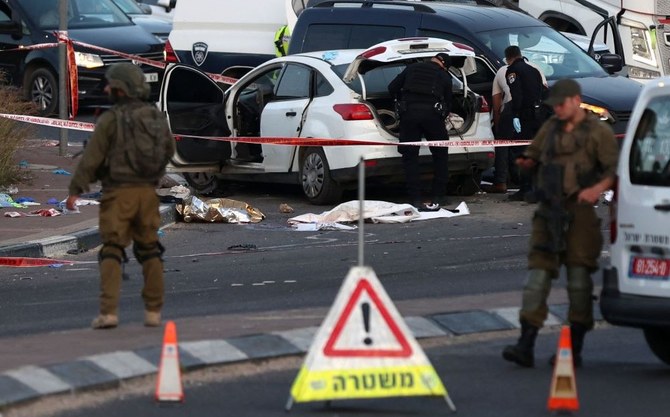RAMALLAH: Two Palestinians were killed by Israelis in the West Bank and Israel on Thursday, according to official Palestinian sources.
The Israeli army shot dead Ahmed Taha, 39, close to the Ariel settlement near Salfit. He was suspected of attempting to carry out a stabbing attack. And Palestinian sources said Amin Warda, a resident of Nuseirat in central Gaza, died after being assaulted by Israelis while working inside Israel.
Their deaths coincided with an unprecedented escalation in attacks by settlers against Palestinians and their property throughout the West Bank.
On Wednesday night, settlers led by extremist Israeli Finance Minister Bezalel Smotrich and other far-right members of the Knesset, stormed the site of the evacuated Homesh settlement, near the town of Silat Al-Dhahr, south of Jenin, and performed Talmudic prayers there, protected by Israeli army forces. They used stones to attack vehicles belonging to Palestinians living by the entrance to the settlement, near Bazariya, northwest of Nablus, breaking some windows.
It came about a month after the Israeli parliament approved a bill granting settlers permission to return to four settlements in occupied Palestinian territories that were dismantled in 2005: Homesh, Ganim, Kadim and Sanor.
Meanwhile settlers cut down more than 160 olive trees in Qaryut village, south of Nablus. And on Thursday, armed settlers attacked cars and properties belonging to Palestinians near the entrance to the village of Ein Shibli, east of Nablus.
Ghassan Daghlas, the Palestinian official in the northern West Bank in charge of issues relating to settlements, told Arab News that 25 armed settlers had targeted vehicles, homes and greenhouses.
“The current period is witnessing a significant escalation of settler attacks, which requires caution and the activation of guard committees to confront these attacks,” he said.
Also on Thursday, settlers uprooted dozens of vine and olive saplings, destroyed crops of eggplant, tomatoes and peppers, and damaged an irrigation system on agricultural land next to Husan village, west of Bethlehem, according to the head of village council, Rami Hamamreh.
Palestinians depend on this land, which contains about 12 water springs, and the crops that grow there for their livelihoods. It has been the target of repeated attacks by settlers.
Elsewhere, four Palestinian farmers and shepherds were injured during an attack by settlers in Khirbet Al-Sakot, in the northern Jordan Valley. It has been targeted by continual attacks since Wednesday.
Tensions in the area began to rise when a group of settlers built a cowshed there a few days ago and destroyed parts of irrigated crops, sparking fears that it was the first step toward establishing a pastoral outpost.
Moataz Bisharat, the official in charge of the Jordan Valley file in Tubas Governorate, told Arab News that a group of settlers had been chasing shepherds in the Sakot area since Thursday morning and also seized a herd of cows.
He said the settlers’ activities indicated they had been tracking shepherds in the area for days, pursuing them on an almost daily basis in many parts of the northern Jordan Valley and forcing them to leave their pastures. Pastoral outposts are reportedly spreading in the region and settlers have seized large areas of pastoral land.
The Israeli army used tear gas to suppress a demonstration on Thursday by residents of the village of Ain Al-Bayda, in the northern Jordan Valley not far from Sakot,.
Also on Thursday, Palestinian Prime Minister Mohammed Shtayyeh discussed the situation in Jericho with the local governor and other officials. The city has been under a tight siege, imposed by the Israeli army, for more than six days.
Shtayyeh condemned the continual incursions into the city and its camps, and said the Palestinian government doing all it can to ensure the siege is lifted. He also stressed the need to halt the incursions into Aqbat Jaber camp and to provide all possible support for the Palestinians living there.




























